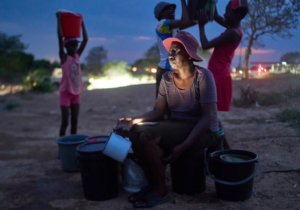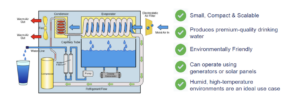Today, we still routinely buy bottled water or, if we are lucky, we can drink water from the tap. Unfortunately, water quality is also worrying, but have you ever thought about what will happen to you if the water sources dry up?
Scientists use the so-called “three rules” to give an idea of how long the human body can survive without basic things: three minutes without oxygen, three days without water, and three weeks without food. According to a previous study by the National Library of Medicine, people deprived of food and water survived an average of 8 to 21 days.

The BBC reports that recently an evangelical pastor in Mozambique tried to follow Jesus’ example by fasting for forty days. Reverend Francisco Barajah completely withdrew food and consumed only minimal water. On the thirty-eighth day of his vows, he was hospitalized in critical condition. They tried to hydrate his body with infusions and liquid food, but they could not save him, and he died two days later, on the fortieth day.
Such experiments are understandably not carried out for ethical reasons, but unfortunately there is plenty of experience in the real world. It is a fact that 3 days of water withdrawal has tragic physiological consequences for humans, and causal catastrophic social effects such as civil war and exodus should not be forgotten.
Spain is now flooded after six months of drought, water supplies in southern Africa are slowly drying up, and this problem is plaguing many countries around the world. Extreme weather due to global climate change and the inadequate attitude of the relevant leaders/politicians are seriously threatening water supplies.

According to Bloomberg, the Zimbabwean city of Bulawayo, with a population of 700,000, is at risk of drying out by the end of 2024. The mayor warns that the crisis could trigger an exodus of residents. Richer countries and wealthy people are still finding ways to meet their own water needs with increasing financial expenditure, but it will certainly not be sustainable in the long run.
The World Economic Forum (WEF) has issued a recommendation that water that can be extracted from vapor in the atmosphere can solve – at least in part – the scarcity of dwindling conventional water resources, as well as the increasingly acute shortage of drinking water that occurs from time to time in certain regions. The distribution of atmospheric water production technology to communities in need can serve as an effective bridging measure for municipalities facing immediate clean water shortages.

The Atmospheric Water Generator (AWG) is a new water industrial technology solution that can instantly produce drinking water using moisture from the air whenever and wherever electricity can be supplied, whether by solar panels or wind generators. AWG-Europe is committed to remedying water supply problems and distributes a wide range of such equipment for family, office, community or industrial use.

connectwiththeworldnow – The tone feels active, I’m drawn to explore more of their content.
sdzmbz.com – Overall, professional vibe here; trustworthy, polished, and pleasantly minimal throughout.
y6113.com – Found practical insights today; sharing this article with colleagues later.
h489tyc.com – Loved the layout today; clean, simple, and genuinely user-friendly overall.
wk552266.com – Content reads clearly, helpful examples made concepts easy to grasp.
hnzkfj.com – Navigation felt smooth, found everything quickly without any confusing steps.
sjqyhl.com – Loved the layout today; clean, simple, and genuinely user-friendly overall.
jnc-fafa15.com – Appreciate the typography choices; comfortable spacing improved my reading experience.
ymxty.com – Color palette felt calming, nothing distracting, just focused, thoughtful design.
ymxty.com – Color palette felt calming, nothing distracting, just focused, thoughtful design.
inclaz.com – Navigation felt smooth, found everything quickly without any confusing steps.
This is my first time visit at here and i am really happy to read everthing at one place.
constantly i used to read smaller articles which as well
clear their motive, and that is also happening with
this article which I am reading here.
Very nice post. I just stumbled upon your weblog and wished to say that
I’ve really enjoyed browsing your blog posts. After all I’ll be subscribing to
your rss feed and I hope you write again very soon!
Hello there, just became aware of your blog through Google,
and found that it’s truly informative. I’m going to watch out for brussels.
I will appreciate if you continue this in future. Many people will be benefited from your writing.
Cheers!
Wonderful blog! I found it while surfing around
on Yahoo News. Do you have any suggestions on how to get listed in Yahoo News?
I’ve been trying for a while but I never seem to get there!
Cheers
Hey I know this is off topic but I was wondering if you knew of any widgets I could add
to my blog that automatically tweet my newest twitter updates.
I’ve been looking for a plug-in like this for quite some time and was hoping
maybe you would have some experience with something like this.
Please let me know if you run into anything.
I truly enjoy reading your blog and I look forward to your new
updates.
Nice post. I learn something totally new and challenging on blogs I stumbleupon everyday.
It will always be interesting to read articles from other authors and practice something from their websites.
I have been surfing online more than three hours today, yet I never found any interesting article like
yours. It’s pretty worth enough for me. In my view, if all web owners and bloggers made good content as you did, the net will be much more useful than ever before.
I am committed to helping others with water issues.Please read my other articles too! Thanks!
I like it when folks get together and share thoughts.
Great website, stick with it!